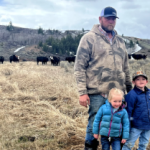Vilsack: Farm bill needs to look forward

Vilsack-RFP-102323
CHICAGO — Agriculture Secretary Tom Vilsack said here Monday that the next farm bill needs to look forward rather than just deal with problems that have come up in the last five years.
In a speech to the International Dairy Federation’s World Dairy Summit, Vilsack said that too much of the farm bill conversation “looks back and says we have to fix what didn’t work” such as disaster programs and reference prices that trigger farm subsidy payments.
Instead, Vilsack said, the farm bill under debate now should incorporate what should be added to make American agriculture succeed far into the future.
Vilsack was referring to the Partnerships for Climate Smart Commodities, a program the Biden administration has developed to address climate change that includes an evaluation of what farm practices may help encourage carbon sequestration and also help farmers improve their incomes through selling commodities marked as climate-smart and also marketing their carbon savings to other industries that need carbon offsets.
Vilsack made the point as part of a broader discussion on the future of agriculture to an audience of several hundred farmers and dairy industry officials from around the world.

Vilsack repeated previous statements that he is bothered about the loss of farms and of farmland since 1981, when then-Agriculture Secretary Bob Bergland, who served in the Carter administration, issued a report that said farm policy was focused too much on per unit production and not enough on individual farms.
That policy, the report said, would lead to larger and larger farms. Vilsack said he was surprised to learn how accurate that report was and again asked if the country is “OK” with those losses.
He noted that the loss of farms has included 230,000 dairy operations.
Vilsack highlighted for an international audience the $3 billion Biden administration program.
INCOME CONCERNS
He also noted his concern about a concentration in income among bigger farmers. Vilsack and Phil Hogan, a former European Union agriculture and trade minister and Irish environment commissioner, both said they believe that climate-smart programs can help farmers achieve higher incomes through what Hogan called “secondary benefits.”
Hogan also highlighted the “Green New Deal” in the European Union, but said that program is “under pressure because it is seen as moving too fast.”
Vilsack, who served as president of the U.S. Dairy Export Council between his two terms as agriculture secretary, said that USDEC, a sponsor of the meeting, would be upset if he did not mention that the United States objects to the EU’s use of geographical indicators to restrict markets for certain cheeses that the EU insists should come only from the places where they originated. U.S. and other new world producers say the cheeses are “generic”and can come from wherever they are produced.
During that discussion, Hogan noted that EU dairy “did not fare badly” in the trade agreements the EU has negotiated in recent years. He also said the French and Italian farmers were happy with the GI provisions in those agreements.
Vilsack and Hogan each received applause for their comments in the GI discussion.
Both Vilsack and Hogan said they believe that dairy can be leader in innovation on climate change and Vilsack said he believes agriculture has the possibility to be the leader on addressing climate change ahead of energy, utilities and transportation.







